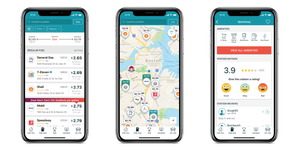- Sure, there are ways to wipe your personal data from your car when you go to sell it, but did you?
- The Privacy4Cars app walks users through the steps to clean up and delete the personal information in a vehicle.
- This is a more business-friendly method of cleaning things up, including creating a compliance record—but whether you use an app or not, clearing your personal data from a car you’re selling or returning to a rental agency is essential.
If we could see our personal digital files, many of us would walk around looking like Pigpen from the Peanuts comics. Connections made by our phones, tablets, and computers leave pieces of our data strewn about behind us everywhere we go. If you’re the careful type, the kind who likes to clean up that digital information trail, then you might have heard of Privacy4Cars. As we start sharing more and more connected cars, tech like this will become less and less optional.
As one weapon in the privacy arsenal, Privacy4Cars has announced a new partnership to clean up used cars sold at America’s Auto Auction. The app works equally well for individuals who are selling a car or even returning a rental that needs to be unpaired from a smartphone.
The Privacy4Cars app shows how to quickly delete personally identifiable information (known as PII) from a car. The app includes step-by-step, VIN-specific instructions for wiping PII from hundreds of different models, with new models added each week. Basically, it walks you through a sequence you could probably figure out, but this is faster and easier.
We Tried It
We downloaded the app to wipe the data from one of our personal cars, and Privacy4Cars worked as advertised. The app would not allow us to register as a temporary guest—meaning we needed to give an email address to access the app—but once we were in, following the eight steps was easy and we were able to wipe our saved data from a 2016 Kia Soul. Without paying, using the personal version of the app will allow you to choose two different vehicles and get the instructions to wipe their data. What’s nice is that you always have access to these two sets of instructions. For more, you can buy individual instructions for $1.99 or buy in bulk, all the way up to 50 vehicles for $69.99.
Here’s how it works. First, you scan in your vehicle’s bar code or identify it through the app’s menus. Then, an image carousel of possible infotainment system head units appears, and you choose the one installed in your car. Next, the app guides you through all of the steps needed to wipe personal data from the vehicle’s memory, including phone contacts, saved navigation locations, and even any universal garage-door opener codes that are keyed to your own house. Privacy4Cars says its app-based system is easier to use than relying on printed manuals in the glovebox or searching for tutorial videos online.
Andrea Amico, founder of Privacy4Cars, told Car and Driver that exactly how much time it takes to clean private data from a used car varies widely. He said most cars require a high-single-digit or low-double-digit number of steps to clear the data, but the record holder requires about 50 steps.
“If you know what you are supposed to do, deleting personal information is a fast and efficient process,” he said.
As part of their new partnership, Privacy4Cars and America’s Auto Auction are offering a subscription-based upgrade for vehicle consignors—the people and organizations who take in used cars and resell them—to make sure PII is wiped clean when a vehicle is sold at one of the 23 locations of America’s Auto Auction.
Amico said his company has conducted a number of statistical analyses over the years to figure out how many vehicles a year are sold with someone’s PII in them, but even he can’t be sure. He just knows that it’s a lot.
“The vast majority of used cars still contain the personal information of previous users,” he said. “This means tens of millions of vehicles, each year, in the U.S. alone, and considering multiple users per household for personal vehicles and many more for other vehicles, like rentals or car sharing, it is possible that more than 100 million synced phones a year leave the personal information of their owners behind.”
Source: Motor - aranddriver.com







